| Day 11 Lhasa ( B,L ) |
| The rush hour of Potala Palace is 10am, so we highly recommend to register and visit it in the early morning, otherwise you might only see the crowd. Plenty time to stay around the Jokhang Monastery and the Barkhor Street in the afternoon. In fact, if you visit the Ramoche Monastery nearby, you will find more local tea houses, market and civilan houses. This is the local portion of Lhasa. |
The Barkhor Street | The Barkhor Street is Lhasa's inner pilgrim circuit shaped roughly like an octagon that runs around the Jokhang. The circuit is lined with markets, shops, stalls and street vendors providing every conceivable item a Tibetan could need. The best place to start the circuit is right outside the Jokhan…… | The Jokhang Temple | The Jokhang Temple is the spiritual centre of Tibet - a destination for millions of Tibetan pilgrims. The oldest part of the temple dates back to the 7th century AD - being one of the two temples built by King Songsten Gampo to house the statues of the Buddha that his two foreign wives brought to Ti…… | The Potala Palace | The Potala Palace is a landmark of Lhasa and Lama Buddism. It is a 13 storey and 1000 rooms' palace and once winter residence of the Dalai Lama. The construction of the present structure began during the reign of the fifth Dalai Lama in 1645 and took more than 50 years to complete. |
|
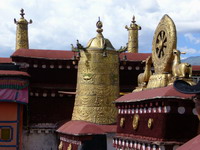 |
| [ Optional ] Ramoche Monastery: it is one of the key cultural relic protection sites in Lhasa, located on the north of Barkhor Street, in the area with a local market and many traditional style Tibetan style civilian houses. |
|
| Day 12 Lhasa ( B,L ) |
| Visit Drepong Monastery, one of the most famous monasteries in Lhasa. In the afternoon, a visit to the local Tibetan family is a happy memory. Please prepare some gifts for this family visit, such as candy or chocolate for kids. |
The Tibet Museum | The Tibet Museum, located in the southeastern corner of Norbu Lingka, Lhasa, is the first of its kind in Tibet to be provided with the latest in equipment and facilities. The Tibet Museum was completed and opened in October 1999. | Tibetan Family Visit | Every Tibetan family has been either directly or indirectly affected by the Chinese, Indian and Nepal culture. Family life is one of the most interesting attractions during your stay in Tibet. Common Tibetan people welcome you to their homes, greet you in their traditional way and entertain you with…… | The Drepong Monastery | The Drepong Monastery: a cluster of white buildings resembling a riceheap, against the backdrop of Mount Gyenbuwndze. Founded in 1416, Drepong is the biggest and richest monastery in Tibet that was divided into four Tantric colleges - that specialised in different branches of knowledge. |
|
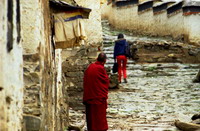 |
| [ Optional ] The Sera Monastery: The Sera Monastery lies on the northern edge of Lhasa at the base of Tatipu Hill. 'Sera' means 'merciful hail' denoting its rivalry with the 'Rice Heap' (Drepong) since hail destroys rice. Sera was smaller than Drepong with about 7,000 monks but was very rich and comparable in power. |
|
| Day 13 Lhasa, Gyantse ( B,L ) |
| Today we will drive from Lhasa to Gyantse (about 380km, 6 hours). Along the way you will pass the Yamdrok Lake and Karola Glacier. Pay a visit to Pelkor Chode Monastery & the Kumbum Stupa in Gyantse before driving to Shigatse (about 90km, 1 hour). Stay overnight in Shigatse. |
Yamdroktso Lake | Yamdroktso Lake (4408 m), where you will enjoy the vista of its pincer-shaped expanse of turquoise water, with the mysterious Mt. Donang Sangwari (5,340m) on the peninsula beyond, and the snow peaks of Nojin Gangzang (7,191m) in the distance. You can walk around the lake before continuing our drive …… | Karola Glacier | Go all the way up to climb up the top of the Gangba-La pass, stop at Yamdroktso Lake, suddenly you will meet Karola Glacier face to face. The Karola Glacier is quite close to the road, a breathtaking view of the Karola Glacier is an unforgetable experience. | Pelkor Chode Monastery & the Kumbum Stupa | Palkhor Monastery was founded in 1418. It houses both Pelkor Chode Monastery and the Kumbum Stupa, the world famous 9-storey 100,000-Buddha Pagoda with 9 floors, 108 doors and 77 rooms. Each room contains a different statue of Buddha and the wall frescoes tells the story. |
|
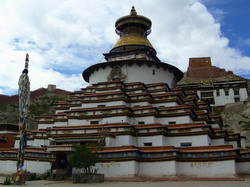 |
| [ Optional ] Dzong Fort: The Dzong Fort is localed on Dzong Hill, in the center of Gyantse. It was the office of the former local governmet of Gyantse. Dzong government of the feudal serf system is still well kept, giving visitors a better understanding of the serf system in old Tibet. |
|
| Day 14 Shigatse ( B,L ) |
| Morning tour to the Tashilumpo Monastery, free market, then drive to Tingri, visit the Sakya Monastery on the way. Stay overnight in Tingri. |
Sakya Monastery | Sakya Monastery is reputed as as the "Second Dunhuang", it is the first Sakyapa monastery of Tibetan Buddhism founded by its initiator Khon Konchog Gyalpo in 1073, from where Sakyapa rose and once ruled Tibet. Standing there now is the old Southern Monastery, an imposing Mongol-style structure. | Tashilhunpo Monastery | Tashilhunpo Monastery, the home of the Panchen Lama, is located on the hillside overlooking Shigatse northwest of the town. Tashilhunpo Monastery for the most part escaped the ravages of the Cultural Revolution and its chapels contain countless statues and mural decorated halls. It was established i…… |
|
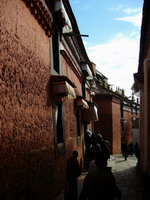 |
| [ Optional ] Tingri Town: Tingri has great tourism potential, with its proximity to the mountains, trekking potential and on the road to/fro Nepal and Everest Base Camp (EBC). It is known for its spectacular views of Mount Everest, Mount Lhotse and Mount Makalu which lie around in what is the highest mountain group in the world. |
|
| Day 15 Shigatse ( B,L ) |
| This morning you will be driven to Mt. Everest (100km, about 3-5 hours), where you will visit the Rongbuk Monastery, followed by a visit to the Mt. Everest base camp to get a closer look at this great mountain. After the visiting, drive back to Tingri. |
Mount Everest | Mount Everest is the highest peak in the world, with a height of 8844.43 meters (29017 feet), massive glaciers and seracs feature a thrilling splendor. The peak has been a holy climbing attraction for world's mountaineers. |
|
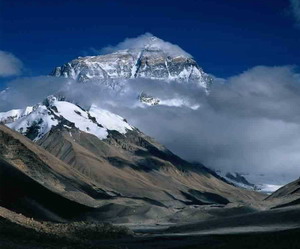 |
| [ Optional ] Rongbuk Monastery: Rongbuk Monastery, at the foot of Mount Mount Everest, is the highest monastery in the world. Many mountaineering experts believe that the Rongbuk Monastery is the best place to appreciate the mightiness of the highest peak in the world. |
|